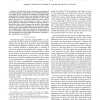84 search results - page 8 / 17 » Hierarchical Latent Knowledge Analysis for Co-occurrence Dat... |
TSMC
1998
13 years 6 months ago
1998
—Knowledge representation is one of important factors that determine human performance on cognitive tasks. Due to different levels of experience, different groups of people may d...
SEMWEB
2009
Springer
14 years 1 months ago
2009
Springer
Abstract. The Semantic Web fosters novel applications targeting a more efficient and satisfying exploitation of the data available on the web, e.g. faceted browsing of linked open...
BMCBI
2006
13 years 6 months ago
2006
Integration of heterogeneous data types is a challenging problem, especially in biology, where the number of databases and data types increase rapidly. Amongst the problems that o...
BIBE
2008
IEEE
14 years 1 months ago
2008
IEEE
— The aim of this work is to propose a new approach for the determination of the design matrix in fMRI experiments. The design matrix embodies all available knowledge about exper...
BMCBI
2006
13 years 6 months ago
2006
Background: An alternative to standard approaches to uncover biologically meaningful structures in micro array data is to treat the data as a blind source separation (BSS) problem...

